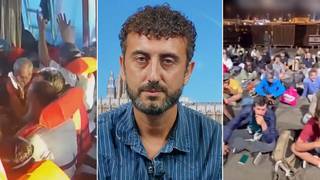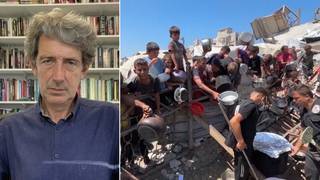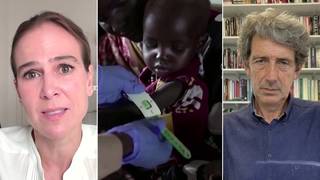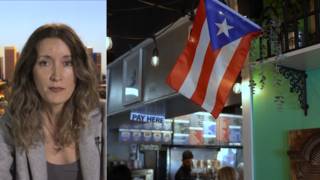
Back from Puerto Rico, Juan Gonzalez reports on two stories coming out of the island over the past week: the Democratic primary, won by Sen. Hillary Clinton and overlooked by Sen. Barack Obama, and a bitter divide within the SEIU. Puerto Rican residents could vote in the primary contest, yet are not allowed to vote in the November elections for president. As the Democratic primary took place, the Service Employees International Union held its national convention in San Juan. The SEIU is embroiled in an internal battle over allegations its leadership is seeking to increase the union’s size and influence at the expense of rank-and-file members. [includes rush transcript]
Transcript
JUAN GONZALEZ: The historic string of Democratic primaries ends today with Barack Obama and Hillary Clinton facing off in South Dakota and Montana. A total of thirty-one delegates are at stake tonight. Obama is within just forty delegates of the 2,118 he needs to clinch the nomination and become the nation’s first black nominee of a major political party. He could hit that number as soon as tonight, depending on how quickly he wins commitments from the nearly 200 still-undeclared superdelegates.
AMY GOODMAN: Tonight’s final nominating contests come on the heels of Clinton’s big win in the Puerto Rico primary on Sunday. Clinton got 68 percent of the vote to Obama’s 32 percent. The turnout was low, with just 16 percent or fewer than 400,000 Puerto Ricans going to the polls. Puerto Rican residents are US Citizens but are not allowed to vote in the November elections for president.
Well, Juan Gonzalez just returned from the island yesterday, where he was on assignment for the New York Daily News. Juan, talk about the whole scene in Puerto Rico.
JUAN GONZALEZ: Well, I think it was actually an unprecedented situation for Puerto Rico in terms of, first of all — I mean, I think there were three long-lasting things that came out. One was the enormous attention that the island got, unprecedented, really, in the history of Puerto Rico. I don’t think there’s ever been that many US and foreign press covering an event on the island. And as a result, the status of the island, its relationship to the United States, the concerns, the economic issues, got far more attention than they’ve ever gotten in the past. So in that sense, the island came out a winner, no matter who was the actual named winner of the primary itself.
So I think that that’s the one long-lasting — for instance, on Saturday I was on the Clinton campaign caravan that was winding through all of these towns in Puerto Rico, and it was a huge flatbed truck filled with reporters from CNN and NBC and the Wall Street Journal, and so on. And it was really an eye-opener for all of these reporters that had never been, most of them, to Puerto Rico, or at least not to the interior. They may have been to the beaches or resort area. And they really learned a lot about the reality of the Puerto Rican [inaudible] sophistication, the economic development and the political divisions within Puerto Rico. So in that sense, it was positive.
I think the other long-term impact was obviously that the Hillary Clinton landslide was far bigger than anyone expected. Some of the earlier polls were showing her ahead about 51 to 38 with about ten percent undecided. And Obama actually received fewer votes than the polls were predicting. He came in with 32 percent of the vote.
And I think a lot of that had to do with the fact that she campaigned heavily in Puerto Rico. Not only did Bill Clinton go down and Chelsea go down, but Hillary spent several days, all of this past weekend and the previous weekend, and as one Puerto Rican politician said to me, “You know, if you want our vote, the least you can do is come and ask for it.” And Barack Obama only spent one day in Puerto Rico, not even a full day. He didn’t do any public campaigning. It was basically a fundraising event. He did do enormous amounts of television, radio, billboards all over the island for Obama, but he didn’t really have much of a campaign that was visible, by him coming himself. And I think that, understandably, the vote here was not going to have any significant effect, and I think he had already decided that the primary was wrapped up.
But I think that the campaign made a mistake long-term, thinking about November, because he once again sort of not only failed to change the dynamic in terms of how the Latinos in the United States and Puerto Rico are not voting for him in large numbers, but he actually exacerbated the problem by appearing to just not even care whether Puerto Ricans were going to vote. And remember, a lot of the Puerto Ricans who vote have relatives all over the United States. There are several million Puerto Ricans here in the United States. So I think that even though Puerto Ricans cannot vote — those on the island can’t vote in the November election, I think it is going to have an impact in terms of people feeling that he’s not connecting and he’s not somehow reaching out. He didn’t even send Luis Gutierrez, who is the main Puerto Rican leader in the United States —-
AMY GOODMAN: The Chicago congressman.
JUAN GONZALEZ: Chicago congressman -— to campaign for him as a surrogate. Luis Gutierrez did not appear on the island either, whereas many of the Latino backers of Hillary Clinton — Nydia Velazquez, congresswoman from Brooklyn; Jose Rivera, the chairman of the Bronx Democratic Party; several other New York councilmen — all went down there to help the Clinton campaign.
So, overall, there’s just still this lack of a connect between Obama and the Latino community, and I think John McCain is going to exploit that in the November elections. McCain, of all the Republicans, has the most positive image in the Latino community. In Arizona and New Mexico and in Florida, he’s going to make major inroads. And I think it’s going to be part of the McCain strategy to peel away a significant portion of the Latino vote.
Now, interestingly, the last time there was a Democratic primary in Puerto Rico, a full-blown primary, in 1988, the winner was Jesse Jackson. Jackson got 90,000 votes, barely beating Dukakis in ’88, who had about 72,000. Simon, Gore, all the others had significant shares. So it is possible if you — but again, Jackson campaigned in Puerto Rico. He went down there. He sought out the votes of the island residents. So I think that Obama has a continuing problem in terms of being able to reach out and solidify his ties with the Latino community. And if he doesn’t begin to address it in a more systematic way, I think it’s going to hurt him in November.
AMY GOODMAN: Now, Puerto Rico is known for huge turnout. It didn’t get that big turnout.
JUAN GONZALEZ: Well, no. That’s the third, I think, and the most important — to me, the most important aspect of this. I went to one town, Cayey, which is removed from the metropolitan area. It’s a mountain town near the southern coast of Puerto Rico. At 11:30 in the morning, halfway through the voting process, out of 3,000 people registered to vote in that one polling place, that one high school, only 150 had turned out. They were expecting maybe 300 by the time the polls closed, which would be ten percent of the voting — of the registered voters. Now, this, you’re talking — and this was throughout the island. About 15 percent of the registered voters participated in this primary. Now, you have to understand, in Puerto Rico voting is like a religion. 80 percent of the people normally turn out in elections. And even in primaries, you get 50, 60 percent. So this was an historically low turnout for an election. And in essence, while Hillary got a landslide — she got a landslide of 15 percent of the voters — the overwhelming majority did not participate.
I think there are two reasons for this. One is, there are a lot of Puerto Ricans who feel, well, since we can’t vote in November when it counts, why should we then participate in a primary that really is only the buildup to the main event? But the other part of it is the fact that many Puerto Ricans don’t relate to politics in the United States. And, in fact, the independence movement, which is small but is still influential, called for a boycott of the elections, and on Election Day they had perhaps the biggest rally of the entire campaign. Nearly 10,000 people on Sunday marched through the streets of Old San Juan, calling this a colonial charade, the entire process a colonial charade, and urging people to boycott.
So I think the abstention came from two sources: one, people don’t relate to it, because they’re still second-class citizens and don’t feel a connection to American politics; and second, the continuing issue that the United States is holding a colony in Puerto Rico, its largest colony. It’s almost always ignored, except in times like this. And the people were sending a message: you’ve got to deal with the colony. You’ve got to deal not with who’s the Democrat and who’s the Republican or which of the Democrats is going to be chosen, but what are you going to do about the future of Puerto Rico in relationship to the United States?
AMY GOODMAN: Well, at the same time as the Democratic primary was taking place, the Service Employees International Union was holding its national convention in San Juan. The SEIU has some 1.7 million members and is organized labor’s biggest and most vocal backer of Barack Obama. As we’ve reported before, there’s a major internal battle going on within SEIU. Union President Andy Stern is facing growing internal criticism that he’s seeking to increase the union size and the leadership’s power at the expense of rank-and-file members. Speaking on the convention floor in San Juan, Stern claimed he was decentralizing the union.
ANDREW STERN: In a union as complex, as complex and rapidly expanding as SEIU, we must decentralize our decision-making even more. Decisions once made by international leaders need to be made by our union’s industry leaders, from local unions, closest to where the members work.
AMY GOODMAN: But dissident members of SEIU took to the floor on Monday in what’s being described as the most contentious labor convention since Stern split the AFL-CIO in 2005. This is Maya Morris, a leader in SMART, the SEIU Member Activists for Reform Today, speaking on the convention floor.
MAYA MORRIS: Ironically, these proposals turn democracy and worker empowerment on its head. Therefore, I move to reject the proposal as it is, and I move to amend the proposal to include a set of principles, policies and programs that guarantee the right of elected rank-and-file members to participate at every level of contract negotiations. Thank you.
AMY GOODMAN: Juan, talk about this split.
JUAN GONZALEZ: Yeah, well, I actually got a chance to talk to many of the SEIU members, even though I did not have a chance to go to the convention. But they had about 5,000 people in Puerto Rico for this conference, so they had all the hotels, and I know quite a few of the leaders and members.
Clearly, there is a continuing battle going on in SEIU, and the focus really has been now the United Healthcare Workers-West in California, led by Sal Rosselli and who have been spearheading this rank-and-file movement calling for greater democracy. Stern and the leadership there have come down very hard on this movement. They did allow debate, because obviously the movement does not have a majority within the union, but it is significant that there’s any kind of a sharp debate or a strong caucus now developing within SEIU.
And I think that there are fundamental issues now within SEIU over how do you define union growth and union democracy. And the reality is that SEIU has increasingly become a more centralized union in the way it operates, and it is increasingly, in terms of some critics, doing anything it can to grow, in terms of making arrangements or deals with political leaders to be able to expand membership in different parts of the country. So I think that this is an important or watershed moment, because the SEIU is leading the supposed reform movement within organized labor, when now the leaders of the reform movement are being challenged over the nature of their reform. And I think that this is the opening salvo in what’s going to continue to be an ongoing battle.
AMY GOODMAN: I also want to talk about the teachers’ union, but let’s go to break, and then we’ll come back. After that, we’ll be joined by David Sirota. His new book is called The Uprising: An Unauthorized Tour of the Populist Revolt Scaring Wall Street and Washington. And then we’ll meet one of the Guantanamo protesters and find out about their sentences. This is Democracy Now! We’ll be back in a minute.
[break]
AMY GOODMAN: We’re staying in Puerto Rico for a moment. The largest union in Puerto Rico, the teachers’ union, is involved in a bitter struggle, where the SEIU sought to raid the union and get their members to arrange a deal with the governor to have their members join the SEIU. This is the president of the Puerto Rico teachers’ union, Rafael Feliciano Hernandez, speaking at a press conference last week here in New York.
RAFAEL FELICIANO HERNANDEZ: We are asking to the SEIU opposition group to stop the Stern anti-democratic politics and to stop the attack of the SEIU union against the teachers’ union in Puerto Rico. We are a rank-and-file union. We are a union that fights for our people. Not only do we fight for our teachers, we fight to develop a good educational system for all our people. And that is the history of Federacion de Maestros.
And I think that the convention is a good moment for the Federacion to develop any struggle against the SEIU direction, the Stern direction and the tactics that they are developing, but also the convention is a good moment to share with the SEIU delegates, the opposition sector of the SEIU delegates that thinks that the Stern politics is bad for the union, and we ask for solidarity, and we ask to stop the aggression of SEIU against our teachers and to our country, because the Federacion is a very important institution in Puerto Rico that is fighting with the communities in many areas. And I think that the alliance between the government, Dennis Rivera and SEIU is an imperialist attack against our country.
AMY GOODMAN: That’s Puerto Rican teachers’ union president, Rafael Hernandez. Juan?
JUAN GONZALEZ: Rafael Feliciano Hernandez, yeah. I think that the key thing here is that the teachers’ union is the largest and most militant union in Puerto Rico and has always been, and the efforts of SEIU earlier this year when the teachers were in the middle of a major battle and a strike with the government to step in, in essence, and to try to take over or raid the leadership of the union, has created enormous reverberations throughout the labor movement in the United States, as well as in Latin America. I think, in fact, one of the most interesting things was that Stern and Dennis Rivera announced before the convention started that they are going to begin a new effort from Puerto Rico throughout Latin America to build ties between the SEIU to build global unions. So, in essence, what SEIU is trying to do by gaining control of the teachers’ union and, in effect, the Puerto Rican labor movement is to then branch out into the rest of Latin America. Now, they insist that they’re not going to do it in a way that will hurt the autonomy or the democracy of those unions, but the record has so far — has not been too good in that way.
And in fact, on Saturday, just as I was on the campaign trail with Hillary Clinton covering that campaign, there was a major confrontation at the SEIU convention center, where the teachers’ union demonstrated, and they were then confronted. The SEIU called in the police. The Puerto Rico’s infamous Fuerza de Choque, the shock police that came in and confronted the teachers, beat quite a few of the teachers. And I think one policeman was injured in the confrontation that lasted a considerable amount of time. Several teachers were detained. I think one was eventually arrested to be charged with the assault on the police officer. But the fact that SEIU would have such a demonstration at its national convention shows that the contradictions are growing there.
And also, Barack Obama was scheduled to be a keynote speaker at the convention but then decided at the last moment not to attend.
AMY GOODMAN: Do you know why?
JUAN GONZALEZ: No, it’s not clear. His campaign just said he wasn’t going to Puerto Rico, so — but he was listed as the keynote speaker at the SEIU convention. I have a feeling it had something to do with the teachers’ demonstration, but I don’t know that for sure.
AMY GOODMAN: And for our radio listeners, we are showing on the television screen the video of the confrontation, and you can go to our website at democracynow.org to see what happened with the Puerto Rican teachers’ union and the police who were confronting them.
JUAN GONZALEZ: Yes.
AMY GOODMAN: It was shot by Frank Lopez, former Democracy Now! producer. And so, where does Puerto Rico go from here? How does it Rico fit into the presidential election, Juan?
JUAN GONZALEZ: Well, now, it’s basically gone from the presidential election, except that Barack Obama did make several promises in terms of attempting to equalize the Medicare and Medicaid benefits to the island, which is a major problem, that the Congress continues to cap all federal entitlement programs to Puerto Rico at a far lower level than the rest of the fifty states. And Puerto Ricans, being US citizens, feel that this is a form of discrimination. He has promised to move on that, and he has promised that he will try to resolve the status issue in Puerto Rico. So I think that if he is elected, there is an opportunity that some of these issues on the island will be addressed, whereas John McCain has not addressed them at all.












Media Options